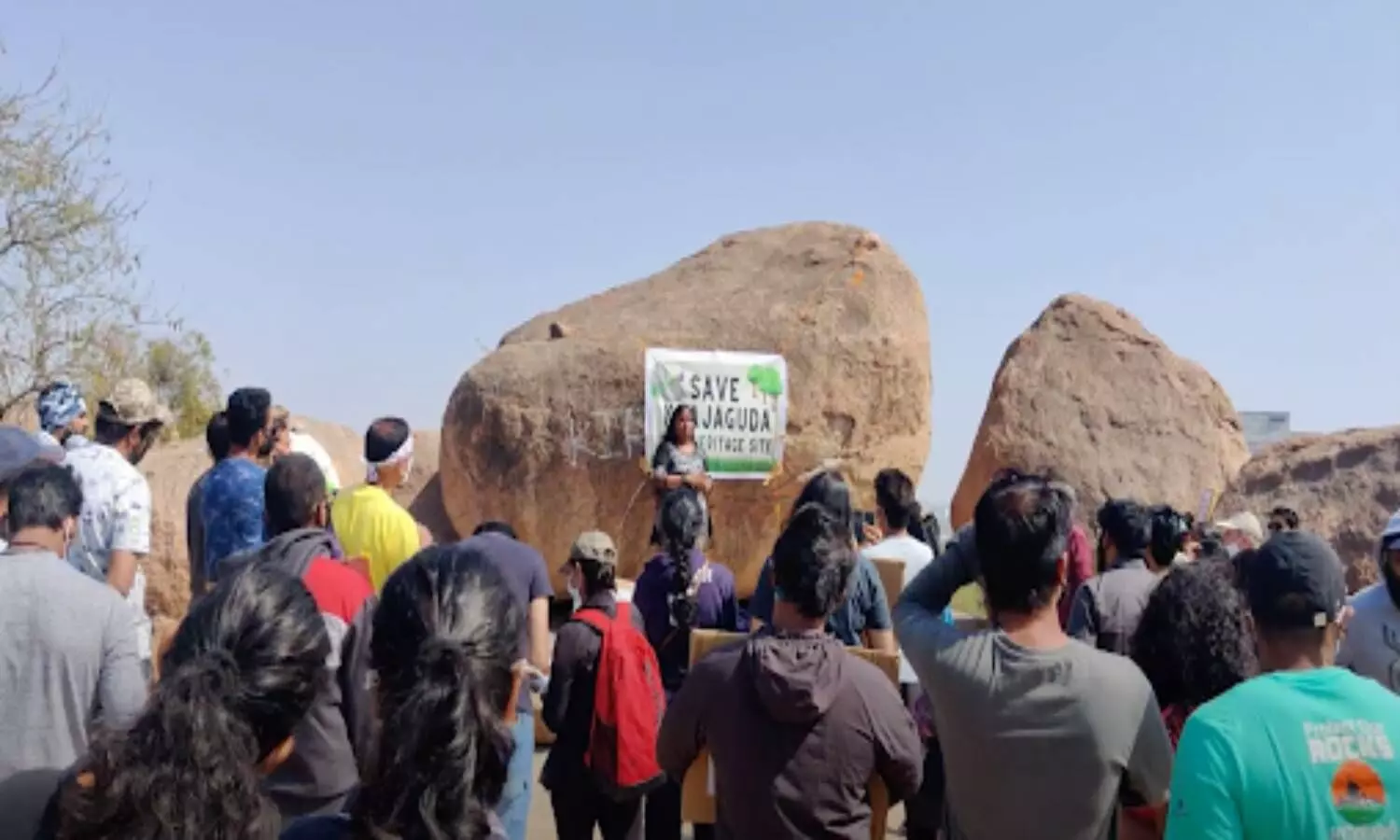`Stop vandalizing natural heritage': Declare Khajaguda cave as reserve forest, civil society petitions KTR
Fakhruddin Gutta heritage site is divided between Puppalguda and Khajaguda villages. Trekkers, rock climbers, walkers, and naturalists have been frequenting the site for a decade.
By Newsmeter Network
Hyderabad: Over a hundred nature enthusiasts from different walks of life gathered at Fakhruddin Gutta, popularly known as Khajaguda cave trail on February 6, to demand that the mindless construction at the oldest site of well preserved natural heritage in Hyderabad be immediately stopped.
Representatives of Hyderabad's rock climbing community and trekking clubs appealed to Municipal Administration and Urban Development (MAUD) Minister KT Rama Rao to intervene immediately to instruct the Conservator of Forests, Ranga Reddy District, and coordinate with the GHMC, HMDA, and district collector of Ranga Reddy to stop all further encroachment work.
They also sought to constitute a high-level committee for investigating the role of the local Mandal Revenue Officer (MRO) of Gandipet and Forest Conservator of Ranga Reddy. Besides, they called for declaring Fakhruddin Gutta (Khajaguda) rocks as a reserve forest and a natural biodiversity heritage park.
Dr. Renuka Pechetti and Sphoorthy Nadimpalli said appeals to the Principal Chief Conservator of Forests, Telangana met with no action. The scale of destruction that is going on now is not possible without the collusion of local officials, they said.
Fakhruddin Gutta heritage site is divided between Puppalguda and Khajaguda villages. Trekkers, rock climbers, walkers, and naturalists have been frequenting the site for a decade. It is also the site of the Hyderabad Climbing Championship, gaining recognition across the country. Over the last few weeks, hundreds of flowering trees and at least half a dozen butterfly groves have been felled. Construction material is continuously being dumped in large quantities every night by trucks to level the ground, Ritwik Reddy and Chanakya Malleboina alleged.
In addition, Saritha Koganti pointed out that the Khajaguda cave trail is of great religious importance to both Hindus and Muslims not just in Hyderabad but in the entire region. Extensive dumping of soil on the rock system could result in the inundation of nearby premium properties.
Frauke Qader, Secretary of Society to Save Rocks noted that Khajaguda is home to the most beautiful and ancient rock systems with rich biodiversity very close to the financial district of Hyderabad. As a global city that has been the venue of international conferences on biodiversity and as a city that prides itself in its heritage as a cultural and economic resource, Hyderabad should do everything to conserve this rock system, which is the state's natural heritage, she said.
Frauke Quader said that the Society has been requesting the Government in power for over 20 years to make this site a self-sustaining rock park, giving the citizens a much-needed lung space. However, no steps have been taken despite several requests and submissions.
She demanded that the Khajaguda hillock be immediately surveyed and provided a proper boundary and declared a Rock Park with a reserve forest status and be given the utmost and urgent protection.
Narrating the history of attempts to protect the Khajaguda rocks, Frauke Qader said this was among the 26 sites that were declared as protected Heritage Precincts under Regulation No. 13 of the Hyderabad Urban Development Authority (HUDA) Zoning Regulations, 1981. Even with the regulation in place, with no mechanism for enforcing, many of the sites suffered extensive damage in the last 13 years and one completely disappeared. However, after the Government of Telangana passed the Heritage Act, even the little protection afforded by Regulation 13 was diluted. Since then it has been an uphill task to get them back into the regime of protection. Meanwhile, rampant real estate growth has been chipping away at these beautiful heritage sites systematically.
Several nature enthusiasts felt that multiple jurisdictions and a lack of stewardship meant that the rocks were open to plundering by many different interests.
Asiya Khan, of the Save Chevella Banyans campaign, said the Hyderabad region was still home to many ecological wonders particularly in the form of flora that cannot be replanted. While the Banyans of Chevella which are at risk of being chopped down to make way for road expansion were a century old and home to extremely rich biodiversity, the Khajaguda caves were micro-ecosystems that were carved 2500 million years ago and therefore were worth preservation.
Recalling her experience in campaigning against quarrying in Karimnagar, Surepally Sujatha, a noted activist, said that the long-term and extended consequences of damaging rock systems of Telangana are imponderable.
She said in scores of villages in Karimnagar where extensive quarrying has been carried out, the ecosystem has been completely altered. Drainage patterns have changed. Flooding is common. Kitchen orchards have been drying up. She warned that destroying Fakhruddin Gutta (Khajaguda) rocks can have dangerous consequences for nearby financial districts.
Lubna Sarwath, a noted climate change activist, said that it is important for civil society to pressurise the government.
The nature lovers who gathered at the cave trail point pledged to dedicate time and energy to help protect not only Fakhruddin Gutta but also all such precious commons in the city.